|
|
|
Sort Order |
|
|
|
Items / Page
|
|
|
|
|
|
|
| Srl | Item |
| 1 |
ID:
099071
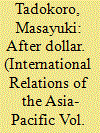

|
|
|
|
|
| Publication |
2010.
|
| Summary/Abstract |
The national currency of the United States, the dollar, plays a critical international role. The privileged position of the dollar, which has greatly facilitated America's role in world politics, is now being questioned. This article argues that the international monetary system tends to be based on hegemony rather than super-sovereignty or multiplicity, and that no serious challengers to the dollar's hegemony have yet emerged. The dollar's predominance, however, is weakening and it has turned into a 'negotiated currency'. If its international roles are to be sustained, the dollar needs to be actively supported by other major economies. 'Negotiation' may fail as rising economies, most notably China, represent American political challengers rather than subordinate allies. Should the dollar cease functioning as the reliable international currency, in the absence of an alternative hegemonic currency, the world could see a more fundamental shift, such as the wider use of private international currencies.
|
|
|
|
|
|
|
|
|
|
|
|
|
|
|
|
| 2 |
ID:
051898
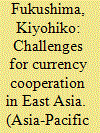

|
|
|
|
|
| Publication |
May 2004.
|
| Summary/Abstract |
The defects of the current international financial system are creating tremendous distortions in the economies of East Asia. For the time being, most of the developing countries in East Asia have no choice but to adopt some sort of a flexible, wider band system (crawling band) while resorting to capital control when necessary, in order to avoid the recurrence of the Asian currency crisis.
Japan's approach to building a stable international financial system in East Asia has gone through several stages since the late 1970s. Though the latest approach of setting up the Asian Bond Fund (ABF) is a step in the right direction, the ABF has severe limitations in reducing the risks for the developing countries in Asia. The ABF needs to be replaced by the Asian Bond Corporation (ABC) in order to develop an international capital market in Asia and use the abundant saving in Asia for financing the growth of Asia. In the process of expanding the activities of the ABC, Asia can adopt the notional common currency based on a basket of major currencies. That notional currency will pave the way toward introducing the Asian common currency, which can be the ultimate goal for the economic cooperation and integration in East Asia.
In the meantime, while enhancing currency cooperation, East Asia needs a lender of the last resort in order to keep its economy from collapsing from another currency attack. Japan has been trying to play that role and is poised to take that responsibility as the largest and the most developed economy in the region.
International capital markets and a truly international currency must be supported by numerous institutions and intellectual frameworks. Asia is yet to build those institutions. To help build those institutions, we in East Asia need to establish a new international research institution which would coordinate the strenuous intellectual efforts needed for building institutions that bolster the international capital market in Asia. The envisaged new institute can be dubbed the "Asian Monetary Institute," or "AMI."
|
|
|
|
|
|
|
|
|
|
|
|
|
|
|
|
| 3 |
ID:
119867
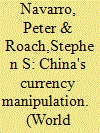

|
|
|
| 4 |
ID:
066825
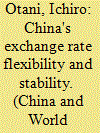

|
|
|
| 5 |
ID:
075402
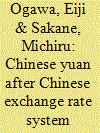

|
|
|
| 6 |
ID:
068975
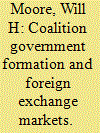

|
|
|
| 7 |
ID:
183774


|
|
|
|
|
| Summary/Abstract |
Governments interact strategically with sovereign bond market creditors: they make choices not only about how often and how much to borrow, but also under what terms. The denomination of debt, in domestic or foreign currency, is a critical part of these terms. The “original sin” logic has long predicted that creditors have little appetite for developing-country government debt issued in domestic currency. Our novel data, including bond issues by 131 countries in 240,000 primary market transactions between 1990 and 2016, suggest otherwise. Domestic-denominated bonds have come to dominate the market, although domestic-currency issuance often is accompanied by shorter bond maturities. We argue that ideologically rooted policy preferences play an important role in this unexpected trend in denomination. All else equal, right governments choose foreign denomination as a means of mitigating currency risk and thus minimizing borrowing costs. In contrast, left governments opt for the flexibility of domestic denomination, and they are better able to act on their preferences in the presence of risk-mitigating monetary institutions and macroeconomic stability. We find support for our argument that partisanship has a robust and enduring relationship with denomination outcomes, even in a marketplace in which domestic-denominated developing-country sovereign bonds have become the norm.
|
|
|
|
|
|
|
|
|
|
|
|
|
|
|
|
| 8 |
ID:
110484
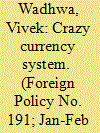

|
|
|
| 9 |
ID:
107893


|
|
|
| 10 |
ID:
106713
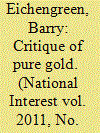

|
|
|
|
|
| Publication |
2011.
|
| Summary/Abstract |
GOLD IS back, what with libertarians the country over looking to force the government out of the business of monetary-policy making. How? Well, by bringing back the gold standard of course.
|
|
|
|
|
|
|
|
|
|
|
|
|
|
|
|
| 11 |
ID:
071217
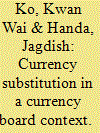

|
|
|
|
|
| Publication |
2006.
|
| Summary/Abstract |
Hong Kong is an open economy that uses foreign currencies extensively in domestic payments. This paper focuses on substitution between the domestic and foreign currencies in their role as media of payments in such an economy. It uses quarterly data to estimate currency substitution (CS) for Hong Kong during 1984:I to 2001:III when it had a fixed exchange rate under a currency board system. Two models, a money demand function and a dynamic adjustment model, are estimated using the Johansen cointegration and error-correction technique. The estimates for both these models indicate significant CS in the media of payments. Our estimates also show a significant ratchet effect in CS.
|
|
|
|
|
|
|
|
|
|
|
|
|
|
|
|
| 12 |
ID:
068009
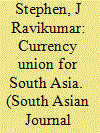

|
|
|
| 13 |
ID:
105051
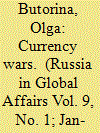

|
|
|
|
|
| Publication |
2011.
|
| Summary/Abstract |
Currency Wars
27 march 2011
Olga Butorina
Who is to Pay the Crisis Exit Fee?
Olga Butorina is a Doctor of Economics, professor, head of the European Integration Department, Advisor to the Director of the MGIMO University of the Russian Foreign Ministry, and a member of the Board of Advisors of Russia in Global Affairs.
Tags
global economy recession Leave a comment Add to blog
?????? ? ??????.?????
Text
Print
One page Page 1 of 4
Resume: The tools available to the world community to try to resolve the currency dispute between the United States and China are very limited. Under a favorable scenario the conflict will remain latent, and under the worst-case scenario it will result in the overall growth of protectionism. Much will depend on how well Western countries can reduce the level of public debt. At the second turn of the debt crisis it will go geopolitical.
See also
The reckless West
Fyodor Lukyanov
Russia's Accession to the WTO: External Implications
Alexei Portansky
When the Dust Settles
Fyodor Lukyanov
Towards a Unified Innovative Market
Vladimir Yevtushenkov
The "Third Cycle": Is Russia Heading Back to the Future?
Kirill Rogov
"Today, as in the past, when economic and financial problems worsen, they upset the social balance, undermine democracy, weaken trust in institutions, and can degenerate into war, civil or foreign…"
Dominique Strauss-Kahn, IMF Managing Director, December 8, 2010
In the 1990s the International Monetary Fund, acting on a tip from the United States, strongly recommended that countries with economies in transition should peg their exchange rates to strong and stable world currencies - in fact, the U.S. dollar. Fixed exchange rates minimized the currency risks of foreign investors and thus promoted the influx of foreign capital, especially into the countries of Southeast Asia.
|
|
|
|
|
|
|
|
|
|
|
|
|
|
|
|
| 14 |
ID:
091949


|
|
|
| 15 |
ID:
092193


|
|
|
| 16 |
ID:
176998
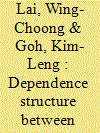

|
|
|
|
|
| Summary/Abstract |
This article investigates the linkages of the movements in Renminbi (RMB) to volatility of exchange rate returns of other currencies before and after the yuan devaluation on 11 August 2015. A comparison between the onshore Chinese yuan (CNY) and the offshore Chinese yuan (CNH) is made. Standard regression methods underestimate the tail dependence between yuan and other exchange rate volatility, as financial data are non-normally distributed, especially when extreme event occurs. We apply Gumbel copulas to capture the presence of tail dependence between RMB returns and the volatility of exchange rate returns for 13 selected currencies, and found dependencies not revealed by the standard ARCH models. The tail dependence has increased after the RMB devaluation, suggesting that RMB depreciation is associated with higher downside risks in these currencies. This is most obvious in the currencies of Asian and ASEAN-5 countries that have strong trade and financial linkages with China. The dependence structure has shifted away from the dominance of onshore CNY rates before the devaluation to the growing importance of more volatile offshore CNH rates after the devaluation. Hence, any large depreciation in CNH will lead to a higher volatility in the other exchange rate returns, and the corresponding downside currency risks are higher than those of the CNY.
|
|
|
|
|
|
|
|
|
|
|
|
|
|
|
|
| 17 |
ID:
056833
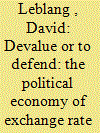

|
|
|
| 18 |
ID:
056694
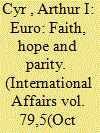

|
|
|
| 19 |
ID:
108953
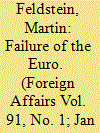

|
|
|
| 20 |
ID:
108957
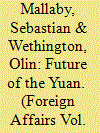

|
|
|
|
|
|
|
|